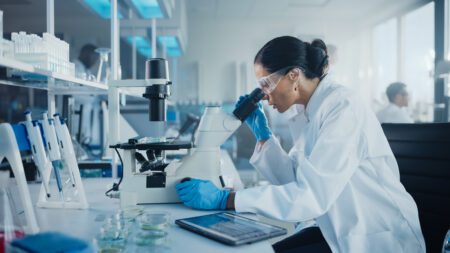
Turning to alternative, or natural, therapies to aid the fertility process can be scary, especially if it involves covering your body in needles. (Or, more needles, if you’re doing IVF!) But Mary Sabo, a natural fertility expert and acupuncturist with more than a decade of experience, says acupuncture can be thought of—in a much less scary way—as a method of improving communication within the body.
“A lot of times as we age there’s a breakdown between the ovaries and the brain and the way they are communicating, and acupuncture’s been shown to strengthen that loop,” she says.
[Acupuncture] can be either the primary care for fertility, or it can be a supportive care in conjunction with Western medicine.
The therapy, which has roots in the Daoist Chinese tradition and dates back more than 8,000 years, involves tiny needles as thin as a hair being inserted along certain pathways of the body that can trigger energy and blood flow into other parts of the body.
Acupuncture can help increase blood flow to the uterus and ovaries, which can slow down with age or stress; decrease inflammation and help regulate the immune system for cases like endometriosis or auto-immune conditions that contribute to miscarriage; and help cases where there are blood clotting disorders, or natural blood flow somehow can’t sustain fertility and a pregnancy.
A benefit of the Chinese medicine system is that it doesn’t focus on just one organ or one disease but on the body as a whole, which also includes mental health. Stress and anxiety are easily triggered in women trying to conceive.
Sabo says: “We have these two sides of our nervous system that help us cope, either when we’re stressed or when we’re relaxed. When we’re relaxed [the parasympathetic nervous system is dominant and] we’re focused on resting, digesting, healing, and reproduction. When we’re in fight-or-flight [mode, the sympathetic nervous system is dominant]. We’re ready to either fight a bear or run. Those two kind of compete with each other. The acupuncture needles kick in the side of [activate] the parasympathetic nervous system,” triggering a rest-and-digest phase.
Sabo sees women who have never been pregnant, those who have miscarried, those who have already had children but are struggling to conceive again, and anyone else seeking help aligning their body to the point that it can bring a baby into the world. She also works with patients’ doctors to ensure that the acupuncture process works in conjunction with other fertility treatments or health concerns.
“What’s cool about what I do, she says, “is it can be either the primary care for fertility, or it can be a supportive care in conjunction with Western medicine. It works really well both ways. There are certain situations where I recommend Western medicine because it’s probably going to work better and faster, and what I’m more interested in is how we can help our patients [achieve positive results] faster and more efficiently.”
However, not all acupuncturists are created equal. Sara Vaccariello, an acupuncturist and owner of Avalon Acupuncture, says to do your research before making an appointment.
“Acupuncture is a licensed profession similar to other medical professions, so you have to be board certified and licensed by the state,” she says.
The National Certification Commission for Acupuncture and Oriental Medicine (NCCAOM), the governing board of acupuncture licensing, is a good place to start, where patients can find lists of certified acupuncturists in their state.
As we age there’s a breakdown between the ovaries and the brain and the way they are communicating, and acupuncture’s been shown to strengthen that loop.
But the vetting process doesn’t stop there. Acupuncture is a very personal process and, especially for fertility, includes intimate conversations about the body to ensure the best treatment.
“The most important thing is to ask questions. Just remember that no question is too weird,” Vaccariello says. “Any professional will be able to calm any worries from a patient.”
It’s also wise to check if insurance covers your treatment as acupuncture is being covered more often. In fact, the Affordable Care Act requires that at least a portion of acupuncture treatment be covered.
“Many times an acupuncturist’s office will actually check your health insurance company policy as a courtesy,” she says.
But if they don’t, call your insurance company and ask the following: Do I have coverage? Do I have both in-network and out-of-network coverage? After I meet my deductible, what percent will be covered? What are the maximum number of visits I have on an annual basis? Is the annual basis a calendar year or a different term (like when your insurance plan started, for example).
If you don’t have sufficient coverage, your company may be able to offer a Flexible Spending Account—pre-tax dollars on a debit card—that you can use to toward the treatment so at least you’re not getting taxed.
Once you’ve found an acupuncturist you’re comfortable with, what’s the process?
Sabo meets with first-time clients for an hour to talk before any needles are used. She also meets with clients for a brief one-on-one discussion at every subsequent appointment. She says some acupuncturists do more talking or energy sessions like Reiki, too. Chinese medicine can include mental health discussions and the use of herbs and oils as well.
One big question: Does an acupuncture treatment hurt? Sabo says, “I pop the needles in really quickly, and most patients don’t feel anything. It doesn’t have to hurt to work,” she says.
Sabo suggests that fertility acupuncture patients consider biweekly or even weekly sessions, depending on the situation. She usually continues treatment until at least success has been assured—when there’s evidence of a fetal heartbeat on a sonogram, which is typically around six to eight weeks into the pregnancy.
“A lot of my patients come about every other week through the first trimester. If they’re feeling very sick with morning sickness, they typically want to come once a week. If women are feeling pretty good, the fetal heartbeat’s strong, things are looking good, sometimes they just stop coming in,” she says.
But Sabo also treats women getting ready for labor. For example, a process called Moxa, that involves using a needle on a woman’s pinky toe, can help signal to the baby to turn if it’s in a breech position.
Even though there are many steadfast believers in acupuncture, it is no secret that many women doubt the value or effectiveness of acupuncture. To that, Sabo says that at the least, it’s a really valuable tool to help you learn more about yourself.
If you don’t like the needles, it’s worth going for a consultation if only to warm you up to the idea and get you more in tune with how acupuncture could work on your body.
Sabo says: “It can help you make a targeted change instead of trying every diet and every supplement under the sun.”
Contributor
Ashley Ross
Ashley Ross is a freelance writer in New York City. Her work has appeared in The New York Times, TIME, Cosmopolitan, Marie Claire, and more. Find her on twitter @Ashbrookeross

Listen to stories, share your own, and get feedback from the community.


















